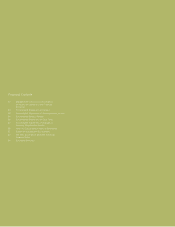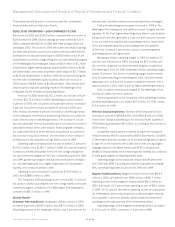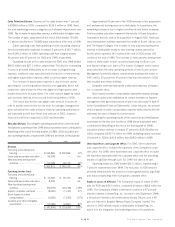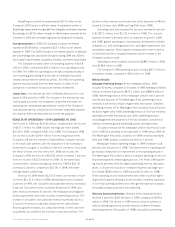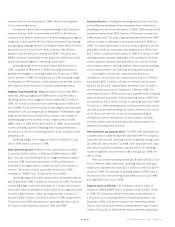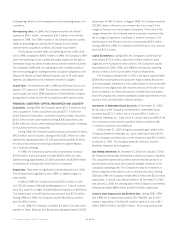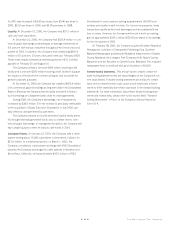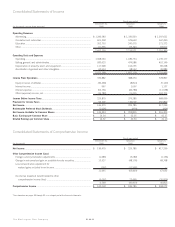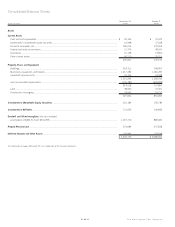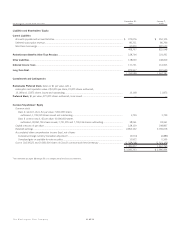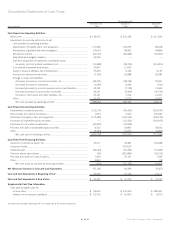Washington Post 2000 Annual Report Download - page 6
Download and view the complete annual report
Please find page 6 of the 2000 Washington Post annual report below. You can navigate through the pages in the report by either clicking on the pages listed below, or by using the keyword search tool below to find specific information within the annual report.
The Washington Post Company 31
to BrassRing, which is in the development and marketing phase of its
operations.
Non-operating Items. In 1999, the Company incurred net interest
expense of $25.7 million, compared to $10.4 million of net interest
expense in 1998. The 1999 increase in net interest expense is attrib-
utable to borrowings executed by the Company to fund capital
improvements, acquisition activities, and share repurchases.
The Company recorded other non-operating income of $21.4 mil-
lion in 1999, compared to $304.7 million in 1998. The Company’s 1999
other non-operating income consists principally of gains on the sale of
marketable equity securities (mostly various Internet-related securities).
The Company’s 1998 other non-operating income consisted mostly of
the non-recurring gains resulting from the Company’s disposition of its
28 percent interest in Cowles Media Company, sale of 14 small cable
systems, and disposition of its investment interest in Junglee.
Income Taxes. The effective tax rate in 1999 was 39.9 percent, as com-
pared to 37.5 percent in 1998. The increase in the effective tax rate
is principally due to the 1998 disposition of Cowles Media Company
being subject to state income tax in jurisdictions with lower tax rates.
FINANCIAL CONDITION: CAPITAL RESOURCES AND LIQUIDITY
Acquisitions. During 2000, the Company spent $212.3 million on busi-
ness acquisitions. These acquisitions included $177.7 million for
Quest Education Corporation, a provider of post-secondary education;
$16.2 million for two cable systems serving 8,500 subscribers; and
$18.4 million for various other small businesses (principally consisting
of educational services companies).
During 1999, the Company acquired various businesses for about
$90.5 million, which included, among others, $18.3 million for cable
systems serving approximately 10,300 subscribers and $61.8 million
for various educational and training companies to expand Kaplan,
Inc.’s business offerings.
In 1998, the Company acquired various businesses for about
$320.6 million, which principally included $209.0 million for cable
systems serving approximately 115,400 subscribers and $100.4 million
for educational, training, and career services companies.
Dispositions. There were no significant business dispositions in 2000.
The Company sold Legi-Slate in June 1999; no significant gain or
loss resulted.
In March 1998, the Company received $330.5 million in cash
and 730,525 shares of McClatchy Newspapers, Inc. Class A common
stock as a result of a merger of Cowles Media Company and McClatchy.
The market value of the McClatchy stock received was $21.6 million.
During 1998 and 1999, the Company sold the McClatchy common
stock for $24.3 million.
In July 1998, the Company completed the sale of 14 small cable
systems in Texas, Missouri, and Kansas serving approximately 29,000
subscribers for $41.9 million. In August 1998, the Company received
202,961 shares of Amazon.com common stock as a result of the
merger of Amazon.com and Junglee Corporation. At the time of the
merger transaction, the Company owned a minority investment inter-
est in Junglee Corporation, a facilitator of Internet commerce. The
market value of the Amazon.com stock received was $25.2 million.
During 1999 and 1998, the Company sold the Amazon.com common
stock for $31.5 million.
Capital Expenditures. During 2000, the Company’s capital expendi-
tures totaled $172.4 million, about half of which related to plant
upgrades at the Company’s cable division. The Company’s capital
expenditures for 2000, 1999, and 1998 are itemized by operating
division in Note L to the Consolidated Financial Statements.
The Company estimates that in 2001 it will spend approximately
$200 million for property and equipment. Approximately 60 percent
of this spending is earmarked for the cable division in connection with
its rollout of new digital and cable modem services. If the rate of cus-
tomer acceptance for these new services is slower than anticipated,
then the Company will consider slowing its capital expenditures in this
area to a level consistent with customer demand.
Investments in Marketable Equity Securities. At December 31, 2000,
the fair value of the Company’s investments in marketable equity
securities was $221.1 million, which includes $210.2 million in
Berkshire Hathaway Inc. Class A and B common stock and $10.9 mil-
lion of various common stocks of publicly traded companies with
e-commerce business concentrations.
At December 31, 2000, the gross unrealized gain related to the
Company’s Berkshire Hathaway Inc. stock investment totaled $25.3
million; the gross unrealized loss on this investment was $19.1 million
at January 2, 2000. The Company presently intends to hold the
Berkshire Hathaway stock long term.
Cost Method Investments. At December 31, 2000 and January 2, 2000,
the Company held minority investments in various non-public companies.
The companies represented by these investments have products or
services that in most cases have potential strategic relevance to the
Company’s operating units. The Company records its investment in
these companies at the lower of cost or estimated fair value. During
2000 and 1999, the Company invested $42.5 million and $33.5 million,
respectively, in various cost method investees. At December 31, 2000
and January 2, 2000, the carrying value of the Company’s cost method
investments totaled $48.6 million and $30.0 million, respectively.
Common Stock Repurchases and Dividend Rate. During 2000, 1999,
and 1998, the Company repurchased 200, 744,095, and 41,033
shares, respectively, of its Class B common stock at a cost of $0.1
million, $425.9 million, and $20.5 million. The annual dividend rate

